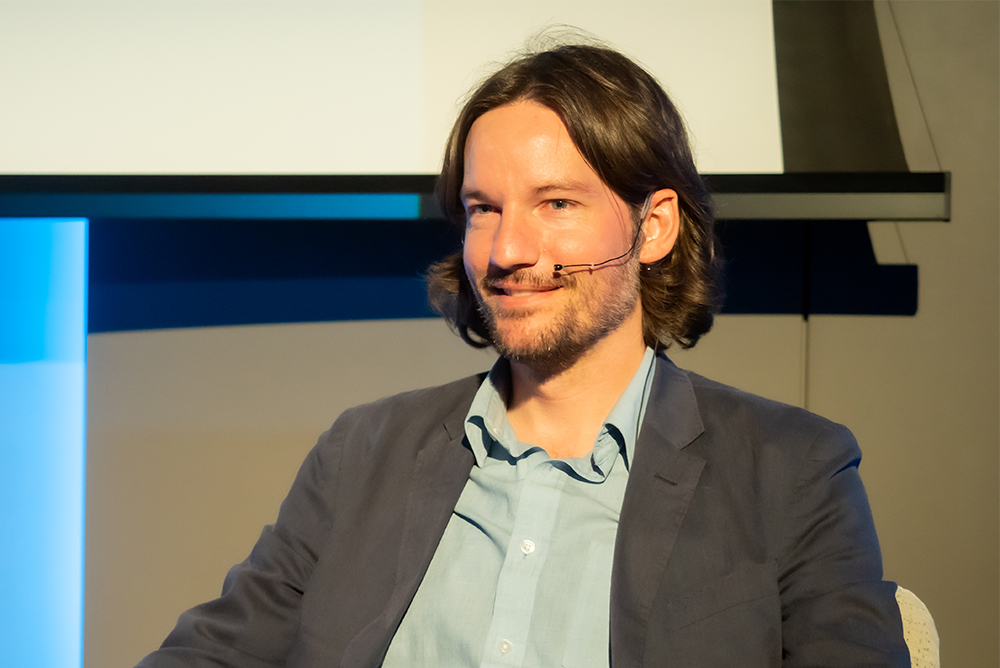
Photo by Tom & Kasi Beck.
Patrick Weems is the executive director of the Emmett Till Interpretive Center and historic Sumner Courthouse in Sumner, Mississippi. Before serving as a panelist for “What Kind of Monuments Do We Deserve?,” the second program in our Mellon-supported series, “How Should Societies Remember Their Sins?,” he joined us in the green room to talk fishing, non-alcoholic beer, and the hope that has kept him in his home state.
What was your favorite college class?
I took a class with Dr. Susan Glisson on the Civil Rights Movement. It was the first class where I read books like Local People by John Dittmer that reframed how to think about the Civil Rights Movement, emphasizing that it wasn’t just Dr. King standing up and Rosa Parks sitting down, but everyday, local people who made change. It really inspired me as a young person who grew up in Mississippi, who never thought Mississippi could change, to learn how young activists—against all odds—made change in this place. I’ve got three older brothers, and they all left the state. It’s very usual that people leave the state when they find opportunity. But this was something that gave me hope to stay.
What’s one piece of advice you’ve received that’s stuck with you?
I like “sh-t happens.” I did a lot of sailing when I grew up. In Jackson, there’s a reservoir called the Ross Barnett Reservoir, named after one of our most racist governors. I went sailing one day there, and my boat got pushed against the rocks, and I couldn’t get it out. I finally got to shore, and I looked at my centerboard, and it was just destroyed. And I’m sitting there, and I felt so bad. But then there was this guy, another sailor, and he came up to me, and he said, “Sh-t happens.”
What’s your favorite guilty pleasure?
I’ve given up tobacco and alcohol, and so my only guilty pleasure right now is probably silly TV shows, like Ted Lasso. I’ve been going through The Mindy Project. And then I’ve been drinking just tons of fake beer, zero-alcohol beer. I had one in the car driving down today.
What’s the best zero-alcohol beer?
Heineken 0.0. It’s beautiful. It’s great. It’s also one of the only ones we can get. But I think there’s a lot now—there’s craft zero-alcohol beer.
What’s the first monument that moved you?
I’ve got a lot of Confederate ones, growing up in Mississippi. My early childhood was going to the Vicksburg National Military Park; going to Beauvoir, which is Jefferson Davis’s house on the Gulf Coast; going to Stone Mountain, which is this, like, Six Flags Over Jesus Confederate statue carved into the wall where they have this weird light show. So I was really steeped in the Lost Cause culture. That moved me because it’s a movement that started in the 1910s; the fact that something that was started 100 years ago could influence me as a young person was my early shaping of how monuments can influence people, and still propagate a white supremacist culture to this day.
What was your favorite part of living in Sumner, Mississippi, where the Emmett Till Interpretive Center is based?
Definitely the stars. You could walk out your door and see every single star. The closest grocery store from us was probably 30 miles away. The closest gas station was probably about 10 miles away. And I could just let my dog out the door, and he’d run wild. And he would always come back with an animal in his mouth. I like bringing my son back to Sumner; my wife’s family has been there for generations. There’s a great little bayou that runs through there. And I’m going to take him fishing this Saturday. He just got a fishing pole. So I’m excited about that.
What is your best fish story?
We went fishing a lot at Dolphin Island, which is a small barrier island off of the Alabama Gulf Coast. My grandfather lived there, and we would keep going back up after he died. It was always like we could feel my grandfather there. And there was one time that we were fishing, and it just started raining all around us, but not on us. There was a little cloud parting right where we were. And it kind of followed us. We hadn’t caught a fish all day. And then all of a sudden, we just caught all of these fish. There were several stories like that where we’d just think, OK, that was Papa Zouk.
What surprises you the most about your work right now?
That we’re thriving. When I first got there, it was really touch and go. We didn’t have any resources. Like, if you asked my wife, she would say she did not believe that we were going to make it. Mentors told me I needed to leave. People were like, this is not going to work. We’re trying to build a memorial to Emmett Till in this really low-resourced area, one of the poorest counties in the country. Our signs would get shot up, and thousands of people would then donate money, and save us to get by for another three months. Or something else would happen, and we’d get a big donation here or there, and we just kind of kept at it. And now we have a staff of six people. We’re getting closer to becoming a national park, hopefully. It’s just really been a miraculous ride.



